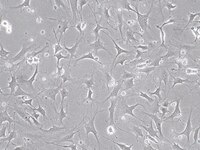SCC494 Sigma-AldrichMouse OP9-DL4 Delta-like 4 Notch Ligand Cell Line
Mouse OP9-DL4 cells express the Notch ligand Delta-like 4 and have been demonstrated to promote T cell lineage commitment in hematopoietic stem cells. These cells support the differentiation of embryonic or hematopoietic stem cells from fetal liver or bone marrow into T lymphocytes. The OP9-DL4 cell line is an essential tool for elucidating Notch signaling in cellular differentiation and the initiation of inflammatory disease states.
More>> Mouse OP9-DL4 cells express the Notch ligand Delta-like 4 and have been demonstrated to promote T cell lineage commitment in hematopoietic stem cells. These cells support the differentiation of embryonic or hematopoietic stem cells from fetal liver or bone marrow into T lymphocytes. The OP9-DL4 cell line is an essential tool for elucidating Notch signaling in cellular differentiation and the initiation of inflammatory disease states. Less<<Recommended Products
개요
| Replacement Information |
|---|
| References |
|---|
| Product Information | |
|---|---|
| Components |
|
| Quality Level | MQ100 |
| Biological Information | |
|---|---|
| Host | Mouse |
| Cell Line Type |
|
| Physicochemical Information |
|---|
| Dimensions |
|---|
| Materials Information |
|---|
| Toxicological Information |
|---|
| Safety Information according to GHS |
|---|
| Safety Information |
|---|
| Product Usage Statements | |
|---|---|
| Quality Assurance | • Each vial contains ≥ 1X106 viable cells. • Cells are tested negative for infectious diseases by a Mouse Essential CLEAR Panel by Charles River Animal Diagnostic Services. • Cells are verified to be of mouse origin and negative for interspecies contamination from human, rat, Chinese hamster, Golden Syrian hamster, and nonhuman primate (NHP) as assessed by a Contamination Clear panel by Charles River Animal Diagnostic Services • Cells are negative for mycoplasma contamination. |
| Usage Statement |
|
| Packaging Information | |
|---|---|
| Material Size | ≥1X10⁶ cells/vial |
| Transport Information |
|---|
| Supplemental Information |
|---|
| Specifications |
|---|
| Global Trade Item Number | |
|---|---|
| 카탈로그 번호 | GTIN |
| SCC494 | 04065269082668 |
Documentation
Mouse OP9-DL4 Delta-like 4 Notch Ligand Cell Line MSDS
| 타이틀 |
|---|
Data Sheet
| Title |
|---|
| Data Sheet-SCC494 |












